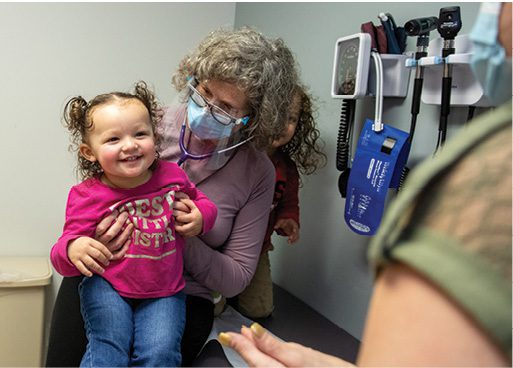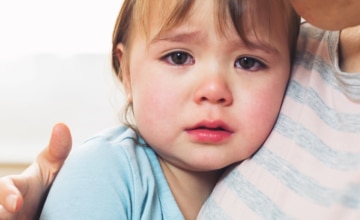Kathy Reschke, ZERO TO THREE, Washington, DC, with
Margaret Tomcho, Sam Sandos Westside Family Health Center, Denver, Colorado
Lizette Melis, North Country HealthCare, Flagstaff, Arizona
Barbara Skodje-Mack, CentraCare – Plaza Clinic Pediatrics, St. Cloud, Minnesota
Claire O’Connell Boogaard, Children’s National Hospital, Washington DC
Abstract
Conversations with families about understanding and nurturing their young child’s development can be both rewarding and challenging. In this article, two seasoned HealthySteps specialists and two HealthySteps physician champions were asked to reflect on this central aspect of their mission in serving infants, toddlers, and families and on what they have learned about doing it well.1
When caregivers bring their young child to the pediatric clinic for a well-child visit, they expect to hear how their child is faring on their developmental journey and how they compare to other children their age. What they may not expect, but very often welcome, is a deeper conversation with a child development and behavioral health expert who provides a safe space for asking questions, expressing concerns or fears, and talking about parenting practices.
These are the kinds of conversations that form the heart of pediatric practices that have adopted the HealthySteps model
and integrated a HealthySteps specialist into the pediatric care team. Pediatric staff at HealthySteps sites approach each visit with the understanding that the caregiver and child together are the “patient,” recognizing that each family with a baby who enters the clinic doors brings unique experiences, perspectives, and knowledge and feelings about parenting that impact the development and well-being of the child. The primary care physician and HealthySteps specialist work together to ensure that both baby and caregiver receive the attention they need to best support development.
1 Each HealthySteps site has a physician champion who provides leadership for installation, implementation, and sustainability of the HealthySteps model.
A Group Conversation
Q1: How does the topic of early development come into play in your work with families of infants and toddlers? How do you see your role?
Margaret (Meg) Tomcho: Early childhood development is a key component of pediatric primary care. It is the bread and butter of what we do. During well-child visits, it is critical for the primary care team to work with families on their understanding of developmental milestones, celebrate their child’s progression, and work to enhance and support development, including social–emotional development. Primary care providers partner with families to understand normal child development and where their child fits in the spectrum of development. In addition, it is important for providers to reassure families when the “normal” development might be challenging or frustrating. Families like to celebrate what their children are doing and learning, and this is a big part of the role of primary care.
Lizette Melis: I echo Meg’s thoughts and love how she put it: Child development is the bread and butter of what pediatric primary care teams do. There are so many directions and tangents worth exploring when speaking with families about their child’s journey. Often, when I enter an exam room, I am curious what direction the conversation will take. By the way, I often use the term “curiosity” when I invite parents to observe their child’s interests, personality, temperament, and development. It is a word that carries no judgment, but instead fosters wonder and attunement.
Meg: Curiosity is a perfect word! It can be used to celebrate the caregivers’ observations of their child and how she or he is evolving.
Barbara (Barb) Skodje-Mack: I appreciate Lizette and Meg’s responses and find that I try to help facilitate parents’ attunement to their infants and toddlers, and develop their relationship with their child through curiosity and wonder. I know that there are lots of demands on caregivers and so I try to make the most of my time in the room by engaging them in that moment, to practice playful and soothing ways to engage with their child; rather than just talking about what they could do at home, to help them experience it in that moment with support and encouragement. I hope this will make it more likely that they will practice these engagement moments outside of the clinic appointments as well.
Q2: What impact does the updating of the American Academy of Pediatrics’ developmental milestones have on your work with young children and their caregivers?
Barb: The updated developmental milestone guidelines increase opportunities for identifying children who may benefit from early intervention and further assessment. This identification is important because early intervention is one of the most important ways to improve outcomes for young children.
As a HealthySteps specialist, it has been rewarding to support caregivers with concerns about their child’s development. Caregivers want their children to be happy and healthy, and some caregivers can feel apprehension around assessing their child’s development. I provide additional explanations on how to watch for milestone success and share ideas for playful ways to engage with their child to help facilitate the development of the skills needed for problem-solving, self-control, socialization, creativity, and communication. Many caregivers are surprised to learn that playful interactions are essential in early brain development.
Meg: The updated developmental milestones better address social–emotional development. Also, by better matching well-child visit periodicity, the milestones provide more concrete guidance so that parents can be better informed on what to ask their pediatrician or HealthySteps specialist.
Lizette: In all honesty, I had to look up the updated developmental milestones before giving a thoughtful answer! If you are like me, you may find this bulleted list of the main changes helpful:
• Added checklists for ages 15 and 30 months; now there is a checklist for every well-child visit from 2 months to 5 years.
• Identified additional social–emotional milestones (e.g., smiles on their own to get your attention, age 4 months).
• Removed vague language like “may” or “begins” when referring to certain milestones.
• Removed duplicate milestones.
• Provided new, open-ended questions to use in discussion with families (e.g., Is there anything that your child does or does not do that concerns you?).
• Revised and expanded tips and activities for developmental promotion and early relational health.
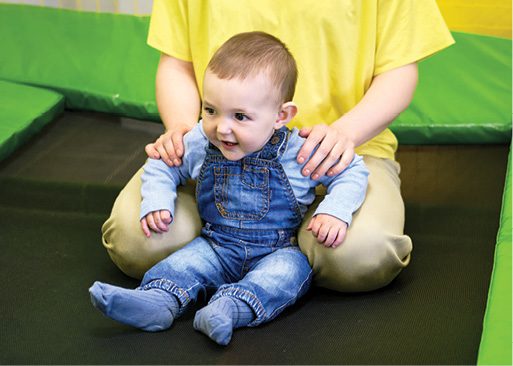
Early intervention is one of the most important ways to improve outcomes for young children.
Changes to fine tune language and remove potential interpretation and ambiguous meaning are greatly useful. Also, adding social–emotional milestones is an important improvement because they can provide conversation starters around the emotional life of babies, not just older littles. I love having more ideas for open-ended questions to keep in my back pocket as I meet with families; I appreciate that improvement as well.
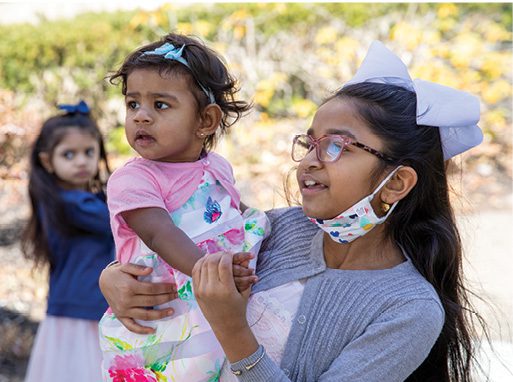
The lack of practice and exposure to social situations has taken a toll for many children’s comfort and ease around public and new environments.
Q3: What questions or concerns about development have been most on the minds of families [with little ones] in your practice recently? Is that a change from your previous experience?
Lizette: Since the pandemic started, I have heard a clear concern around the social–emotional development of toddlers and preschool-age children. The lack of practice and exposure to social situations has taken a toll for many children’s comfort and ease around public and new environments. I also hear concerns related to perceived and often real speech delays. I have noticed an increase in the number of parents
of 2–4-year-olds who notice their child has a narrow array of spoken words or phrases, depending on their age. The concern is mostly around expressive language, rather than receptive language. I do believe the increase in this commonly seen delay is the high reliance on and use of technology as entertainment and, often, replacement for direct interaction between caregiver and child.
Barb: Since the pandemic, I have noticed caregivers having more concerns about how to seek out early social–emotional activities and caregiver support. For example, previously, many caregivers would seek out local early childhood family education classes for infants and toddlers as a fun way to connect with other families, play and engage with their child, and receive support and parent education specific for the developmental age and stage of their child. The local school district has worked hard to support families during these unprecedented times, but I hear caregivers express worry about the impact of the lack of these typical social outings and experiences for their child, as well as feeling the loss of community parenting supports during the height of the pandemic.
Meg: Since the start of the pandemic, in my experience, families have focused lots of concern on vaccines and protection from exposure to infections. Previously, the communities served by my clinic rarely questioned vaccines and recognized the importance of the protection they impart. However, we have seen a dramatic shift and caregivers are now expressing significant concerns about the vaccines and are willing to not immunize their children even if it compromises their ability to participate in developmental activities such as preschool or story hour. While this is not a direct concern about development as the question poses, it is a major issue that will have a significant impact on development. At the same time the caregivers are fearful of vaccines, they are also fearful of exposing their infants and toddlers to preschool and other opportunities such as library story hours, even after regulations have relaxed. Consequently, it is imperative that pediatricians and HealthySteps specialists continue to provide support to parents around the importance of social interaction on development and bring development back to the forefront of discussions.
Families have also expressed concerns around the limitations of early intervention for those with identified delays. Our early intervention is still remote in many cases and has waitlists of months, which is also concerning given the time sensitivity. We’ve relied more and more on our HealthySteps team to continue to support and enhance families’ abilities to promote their child’s development.
Q4: What is one of the most valuable things you have learned in your experience about talking with caregivers about their young child’s development?
Lizette: One of the most valuable things I can share with parents is the value of understanding their child’s developmental stage. When parents are aware of what to expect, it inevitably increases their understanding of why their child may act in a certain way. This understanding, in turn, can be critical in experiencing a child’s behavior as expected and natural rather than as a purposeful way to upset parents. This understanding often translates into greater patience and even delight in a child’s behavior, even when challenging. For example, sharing with parents the fact that young children are incapable of exercising impulse control can help parents be more compassionate, patient, and calmer when their child acts impulsively. I have also learned it is important to remember children’s development does not follow a straight line or a singular trajectory across the board. Reminding parents of this can help alleviate making comparisons and therefore, may reduce anxiety and judgment.
Meg: Lizette’s comment above is perfect! I echo it completely!
Barb: Agree, Lizette! I like to find out what caregivers already know about their child’s development so that I can tailor my information to best match their needs for understanding their child’s development. I have also found that helping caregivers understand basic brain development can increase buy-in for them as they understand the why behind what we are encouraging them to do. For example, I talk with caregivers about how parts of the brain that understand language are developing even before the child can speak their first words, so talking, reading, counting, pointing and naming objects, even narrating simple day-to-day activities, all help their child’s brain development.
Q5: Any additional thoughts you’d like to share about supporting families in nurturing their young children’s development?
Lizette: Dr. [T. Berry] Brazelton’s sentiments guide my work with families: Parents want to know and hear they are good parents. Remembering to take notice of their true desire to do the best by their children can help parents feel seen and “catching” them using positive parenting principles can quickly create a positive connection with them while recognizing their attunement to their child.
Meg: This is what I like to tell parents: Believe in yourself! Recognize how important you are to your baby. You are your child’s entire world and have everything you already need to succeed. Talk and play with your child. Laugh with your baby. Enjoy every moment.
Lizette: Agreed, Meg! I like your idea around how building parents’ confidence can make such a difference for parent–child dyads as well as entire families. It is critical to remind parents we all make mistakes; it is important to practice self-compassion. I remember sitting on the floor when my twins were 3; I was the one crying! I said, “Being a mami is a hard job.” They both came and sat on my lap and that made it all better. As a parent, I have and continue telling myself: I make mistakes and will continue making them because I am human—but will do my best to learn from the experience and move on.
Barb: Although mindfulness might not be the first thing that comes to mind when thinking about supporting families in nurturing their children’s development, it is a perfect way to help caregivers develop a new skill to counteract stress and creates a thoughtful and responsive environment that fosters the social–emotional skills children need to build resiliency and healthy relationships.
One of my favorites to share with caregivers of infants, especially when they describe feeling overwhelmed and exhausted, is the Pleasure Gazing mindfulness practice posted on the ZERO TO THREE website www.zerotothree.org/resource/pleasure-gazing. It helps caregivers practice engaging in calm co-regulation with their infant.
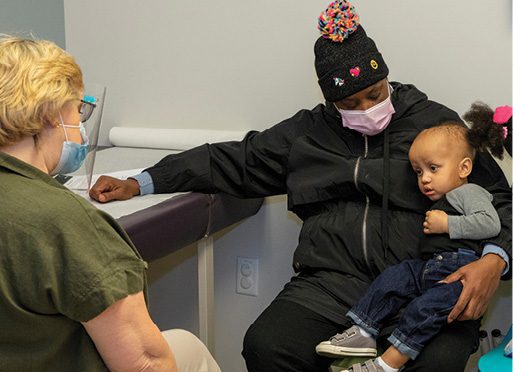
When parents are aware of what to expect, it inevitably increases their understanding of why their child may act in a certain way.
Here are the steps:
• Start by taking a few deep breaths and notice how your body feels. You can use long, slow exhales, or even sigh out loud to help you ease any tension.
• Now, look toward your baby with kindness and curiosity. You might ask their permission to begin this interaction, noticing if they show any signs of interest or engagement.
• Start by using your sense of sight. Gaze at your baby–what do you see? Use your eyes to look closely at the features of their face with a gentle smile. What are all the different colors you see in their eyes? What is the exact shape of their smile? Look at their fingers and toes, taking time to notice small things you haven’t noticed before. Go slowly, feature by feature. Notice the warm connected feelings that may arise as you pay close attention to your baby in this activity.
• Once complete, take a few deep breaths in and out and notice how you are feeling now.
I will walk through these simple steps with caregivers and their infant, and they are often surprised how easy it is and how much their child enjoys it as well!
A Personal Reflection
Claire O’Connell Boogaard
I remember sitting in orientation for HealthySteps, watching the videos and developing an understanding for how added support could be integrated into the clinic. I was a junior faculty member, with only 2 years of practice under my belt, and I was both relieved and intimidated by having the additional support. On one hand, a HealthySteps specialist would have more time with the patient to build rapport, gather history, and problem solve around developmental concerns the family may have; on the other hand, having a developmental expert counsel patients around strategies and behaviors that I was struggling with myself as a new mom was very humbling. Soon after orientation, however, as the clinic’s HealthySteps team began integrating and collaborating with the clinicians, the benefits of HealthySteps were so heavily appreciated by the providers, myself included, that I could not imagine working at a center without them.
The clinic’s HealthySteps team members have been beautiful guides to our patients and providers alike. They demonstrate age-appropriate strategies to explore developmental milestones in young kids (e.g., playing peak-a-boo with an 18-month-old to assess joint attention) all while approaching parents’ concerns with a strength-based empathic lens. I remember a tired a mom of a young toddler expressing exhaustion around her child’s “nonstop” energy and the frustration it caused her. As the clinician in the room and as a parent of a similar aged child, I know this admission required the humility and courage that only come when you are out of other options. The HealthySteps specialist beautifully acknowledged the mom’s concern, while reframing his behavior in a more positive light:
Yes, I can see he is so curious and brave. However, I can also see how much work it must be to keep your child safe when he’s always looking to explore. Although I know it’s exhausting, I first want you to know I can tell you’re doing a great job building his security because of how confident he is, and I can help come up with some ways to make keeping him safe easier on you.
Simple acknowledgment of the hard work, mixed with compliments on her parenting and her child’s intellect, went a long way: the mom’s face changed from feeling defeated to subtly beaming with pride. Next the HealthySteps specialist gathered more history, treating Mom as the child’s expert. She explored behaviors or times of day that were most difficult for Mom. Mom found the evening time the hardest, as it was right when she was getting home from work, already tired and needing to make dinner. The specialist acknowledged the push and pull between children needing attention and the tasks required to keep them healthy (in this case, cooking). They came up with
a creative solution incorporating some focused play with the child for 5 minutes and then rearranging some kitchen drawers so he could play with non-dangerous plastic containers while Mom cooked. Mom seemed relieved and hopeful as she left.
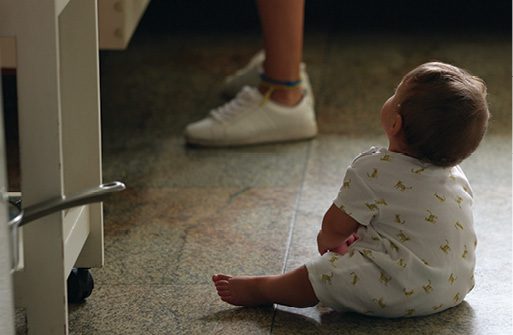
Mom found the evening time the hardest, as it was right when she was getting home from work, already tired and needing to make dinner.
The HealthySteps team does a beautiful job keeping strong relationships with providers and families at the forefront of their work. This allows for easy shared decision making between all. As a provider, this has been so useful with the most complex patient scenarios. Whether it was having the HealthySteps specialist learn needed social context to help inform our medical treatment plan (e.g., “Parents are separating so medication was left at Dad’s house”) or having the HealthySteps specialists reiterate the appropriate medical plan to the patient to ease mom’s anxiety (e.g., “Remember, although your infant has reflux, changing the formula is not needed because he’s gaining great weight.”), the HealthySteps team is an integral part of the clinic’s health care team and multiplies the benefits of infant well care to the patient and family. Again, I could not imagine working in a clinic without them.
Author Bios
Kathy Reschke, PhD, is a senior content specialist for ZERO TO THREE. Dr. Reschke provides expertise in child development, adult learning, and online professional development to the HealthySteps National Office and serves as editorial assistant for the ZERO TO THREE Journal. Dr. Reschke holds a doctorate in human development and family studies with a specialization in early childhood education from Iowa State University.
Margaret (Meg) Tomcho, MD, has been a pediatrician at Denver Health’s Westside Pediatrics and Adolescent clinic for more than 10 years. Dr. Tomcho spent nearly a decade practicing pediatrics on Colorado’s rural western slope where she was first introduced to HealthySteps and experienced firsthand how this program enhances primary care in rural communities. After moving to Denver, she worked to bring HealthySteps to Denver Health and is the current physician champion.
Lizette Melis, MEd, has been a HealthySteps specialist for 9 years at North Country HealthCare, a community health clinic, in Flagstaff, AZ. Lizette was born and raised in Mexico City and earned a master of arts in special education and early childhood development as well as an MA in human resource development. She often finds herself wondering how it is that she landed the best job ever.
Barbara (Barb) Skodje-Mack, EdD, LMFT, LPCC, RPT-S, is the HealthySteps specialist for CentraCare–Plaza Clinic Pediatrics
in St. Cloud, MN. Ms. Skodje-Mack’s training as a licensed marriage and family therapist and registered play therapist-supervisor has served her well in this role. She enjoys working with the child–caregiver relationship, especially helping to build positive and attuned caregiving skills, creating opportunities for play, and providing timely child development information and support for a strong start in life.
Claire O’Connell Boogaard, MD, MPH, is an academic community-based pediatrician and a HealthySteps physician champion at Children’s National Hospital’s Children’s Health Center at THEARC. She also is the medical director for Quality Improvement with the Pediatric Health Network, a regional clinically integrated network working to improve care delivery and practice reimbursement for regional network practices.
Suggested Citation
Reschke, K. (with Tomcho, M., Melis, L, Skodje-Mack, B., & Boogard, C. O.). (2022). Supporting caregivers in nurturing their young children's development. ZERO TO THREE Journal, 43(1), 70–75.

